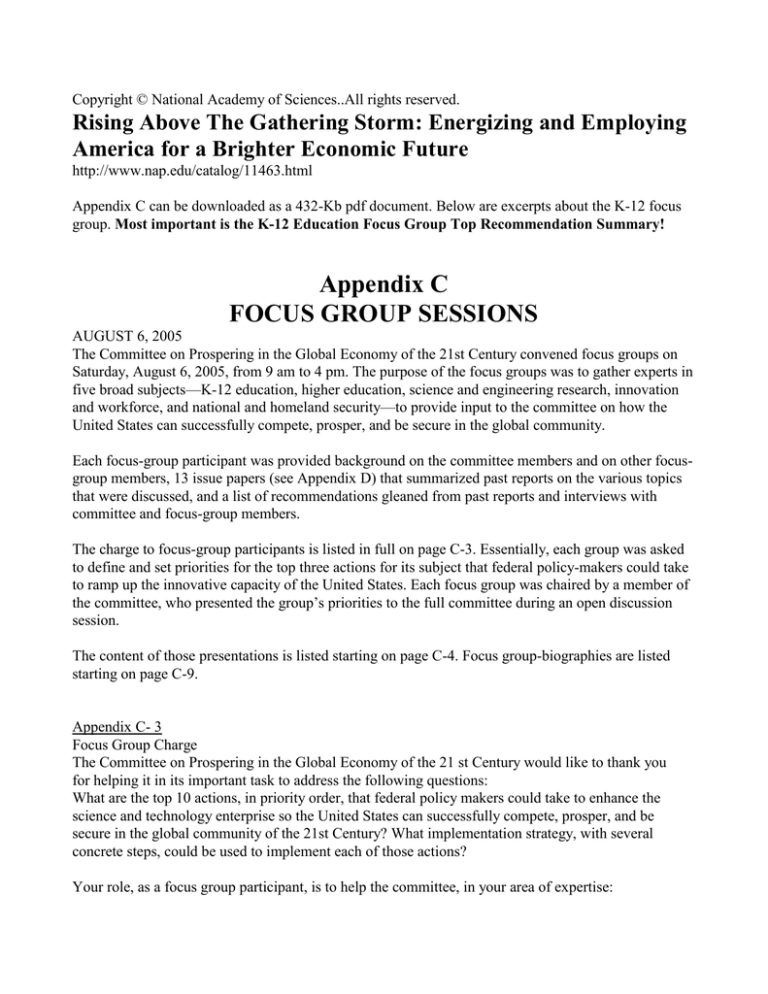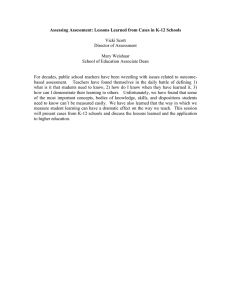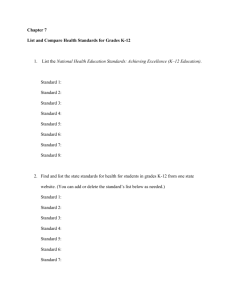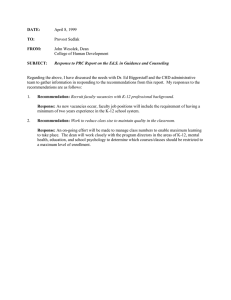
Copyright © National Academy of Sciences..All rights reserved.
Rising Above The Gathering Storm: Energizing and Employing
America for a Brighter Economic Future
http://www.nap.edu/catalog/11463.html
Appendix C can be downloaded as a 432-Kb pdf document. Below are excerpts about the K-12 focus
group. Most important is the K-12 Education Focus Group Top Recommendation Summary!
Appendix C
FOCUS GROUP SESSIONS
AUGUST 6, 2005
The Committee on Prospering in the Global Economy of the 21st Century convened focus groups on
Saturday, August 6, 2005, from 9 am to 4 pm. The purpose of the focus groups was to gather experts in
five broad subjects—K-12 education, higher education, science and engineering research, innovation
and workforce, and national and homeland security—to provide input to the committee on how the
United States can successfully compete, prosper, and be secure in the global community.
Each focus-group participant was provided background on the committee members and on other focusgroup members, 13 issue papers (see Appendix D) that summarized past reports on the various topics
that were discussed, and a list of recommendations gleaned from past reports and interviews with
committee and focus-group members.
The charge to focus-group participants is listed in full on page C-3. Essentially, each group was asked
to define and set priorities for the top three actions for its subject that federal policy-makers could take
to ramp up the innovative capacity of the United States. Each focus group was chaired by a member of
the committee, who presented the group’s priorities to the full committee during an open discussion
session.
The content of those presentations is listed starting on page C-4. Focus group-biographies are listed
starting on page C-9.
Appendix C- 3
Focus Group Charge
The Committee on Prospering in the Global Economy of the 21 st Century would like to thank you
for helping it in its important task to address the following questions:
What are the top 10 actions, in priority order, that federal policy makers could take to enhance the
science and technology enterprise so the United States can successfully compete, prosper, and be
secure in the global community of the 21st Century? What implementation strategy, with several
concrete steps, could be used to implement each of those actions?
Your role, as a focus group participant, is to help the committee, in your area of expertise:
• Identify existing ideas the federal government (President, Congress, or federal agencies) could
take. The ideas should not be to general—they need to be sufficiently actionable that they could
be turned into congressional language.
• Brainstorm new ideas
• Evaluate all ideas
• Prioritize all ideas to propose to the committee the top 3 actions the federal government could
take so that the United States can successfully compete, prosper, and be secure in the global
community of the 21 st century.
Since there are 5 focus groups, we expect a total of 15 prioritized recommendations to result from the
focus group session which will be presented and discussed at a plenary session at the end of the day.
These 15 recommendations that would then be used by the committee as input to its decision-making
process as it comes up with a "top 10" list on Sunday.
Each focus group is chaired by a committee member and has a staff member with expertise in the
issue and a S&T policy fellow (graduate student) to assist them. The staff is available to put together
any
action list that is produced (no summary of the discussion is planned).
In evaluating each proposal, here are some evaluation criteria to keep in mind:
Minimum Selection Criteria
• Can the actions be taken by those who requested the study? The President, Congress, or the
federal agencies?
Evaluation Criteria
• Cost—What is a rough estimate of how much the action will cost? Is the cost reasonable relative to
the financial resources likely to be available? Can resources for this action be diverted from an existing
activity as opposed to “new money”?
• Impact—Which degree of impact is the action likely to have on the problem of concern?
• Cost-effectiveness—Which actions provide the most “bang for the buck”?
• Timeframe—What is the desired timeframe for the action to have an impact? Is the action likely to
have impact in the short or long-term or both?
• Distributional Effects—Who are the winners and the losers? Is this the best action for the nation as
a whole?
• Ease of Implementation—To what degree is the challenge easy, medium, or hard to implement?
• History—Has the action been suggested by another committee or policymaker before? If so, why
has it not been implemented? Can the challenges be overcome this time?
• Is the Moment Right for this Action? Are they likely to be viable in the near-term political and
policy context?
Appendix C- 4
K-12 Education Focus Group Top Recommendation Summary
Roy Vagelos, Chair
National Objectives
• Lay a foundation for a workforce that is capable in science, technology, engineering, and
mathematics (STEM)—including those who can create, support, and sustain innovation.
• Develop a society that embraces STEM literacy.
• Develop and sustain K-12 teacher corps capable of and motivated to teach science and
mathematics.
• Establish meaningful measures.
Top Recommendations
1. The federal government should provide peer-reviewed long-term support for
programs to develop and support a K-12 teacher core that is well-prepared to teach
STEM subjects.
a. Programs for in-service teacher development that provide in-depth content and
pedagogical knowledge; some examples include summer programs, Master’s
programs, and mentor teachers.
b. Provide scholarship funds to in-service teachers to participate in summer institutes
and content-intensive degree programs.
c. Provide seed grants to universities and colleges to provide summer institute and
content-intensive degree programs for in-service teachers.
2. Establish a program to encourage undergraduate students to major in STEM and
teach in K-12 for at least 5 years. The program should include support mechanisms
and incentives to enable teacher retention.
a. Provide a scholarship for joint STEM bachelor’s degree + teacher certification
program. Mandate a service requirement and pay a federal signing bonus.
b. Encourage collaboration between STEM departments and education departments
to train STM K-12 teachers.
3. Provide incentives to encourage students, especially minorities and women, to
complete STM K-12 coursework, including
a. Monetary incentives to complete advanced coursework.
b. Tutoring and after school programs.
c. Summer engineering and science academies, internships, and research
opportunities.
d. Support school and curriculum organization models (state-wide specialty schools,
magnet schools, dual-enrollment models, and the like).
4. Support the design of state public school assessments that measure necessary
workplace skills to meet innovation goals and ensure No Child Left Behind
assessments include these goals.
5. Provide support to research, develop, and implement a new generation of
instructional materials (including textbooks, modules, computer programs) based
on research evidence on student learning outcomes, with vertical alignment and
coherence across assessments and frameworks. Link teacher development and
curricular development.
K-12 Focus Group Participants
Roy Vagelos, retired Chairman and Chief Executive Officer, Merck & Co., Inc., Chair
Carolyn Bacon, Executive Director, O’Donnell Foundation
Susan Berardi, Consultant
Rolf K. Blank, Director of Education Indicators, Council of Chief State School Officers
Rodger W. Bybee, Executive Director, Biological Sciences Curriculum Study
Hai-Lung Dai, Hirschmann-Makineni Chair Professor of Chemistry, University of Pennsylvania
Joan Ferrini-Mundy, Associate Dean for Science and Mathematics Education and Outreach,
College of Natural Science, Michigan State University
Bruce Fuchs, Director, Office of Science Education, National Institutes of Health
Ronald Marx, Professor of Educational Psychology and Dean of Education, University of
Arizona
David Monk, Professor of Educational Administration and Dean of College of Education,
Pennsylvania State University
Carlo Parravano, Executive Director, Merck Institute for Science Education
Anne C. Petersen, Senior Vice President for Programs, W.K. Kellogg Foundation
Helen Quinn, Physicist, Stanford Linear Accelerator Center, Stanford University
Deborah Roudebush, Physics Teacher, Fairfax County Public Schools
Daniel K. Rubenstein, Mathematics Teacher, New York City Collegiate School
J. Stephen Simon, Senior Vice President, Exxon Mobil Corporation
Copyright © National Academy of Sciences..All rights reserved.
Rising Above The Gathering Storm:Energizing and Employing America for a Brighter Economic
Future
http://www.nap.edu/catalog/11463.html



